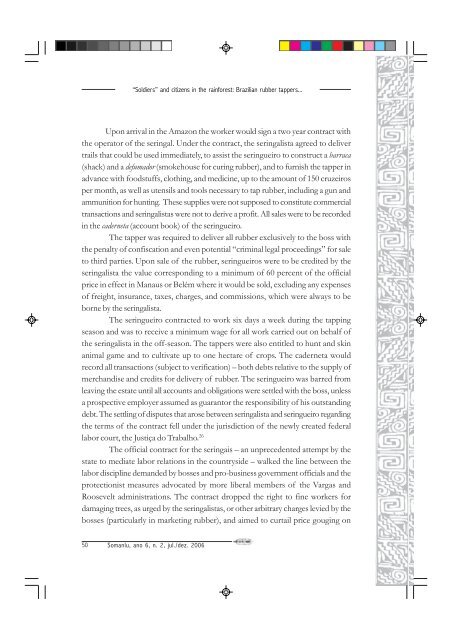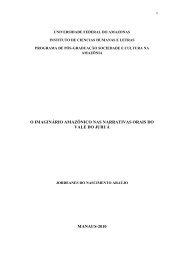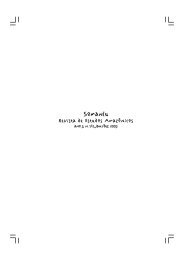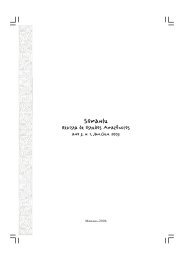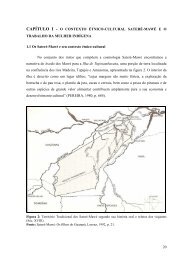somanlu jul dez 2006.pmd - Eventos - Ufam
somanlu jul dez 2006.pmd - Eventos - Ufam
somanlu jul dez 2006.pmd - Eventos - Ufam
Create successful ePaper yourself
Turn your PDF publications into a flip-book with our unique Google optimized e-Paper software.
“Soldiers” and citizens in the rainforest: Brazilian rubber tappers...<br />
Upon arrival in the Amazon the worker would sign a two year contract with<br />
the operator of the seringal. Under the contract, the seringalista agreed to deliver<br />
trails that could be used immediately, to assist the seringueiro to construct a barraca<br />
(shack) and a defumador (smokehouse for curing rubber), and to furnish the tapper in<br />
advance with foodstuffs, clothing, and medicine, up to the amount of 150 cruzeiros<br />
per month, as well as utensils and tools necessary to tap rubber, including a gun and<br />
ammunition for hunting. These supplies were not supposed to constitute commercial<br />
transactions and seringalistas were not to derive a profit. All sales were to be recorded<br />
in the caderneta (account book) of the seringueiro.<br />
The tapper was required to deliver all rubber exclusively to the boss with<br />
the penalty of confiscation and even potential “criminal legal proceedings” for sale<br />
to third parties. Upon sale of the rubber, seringueiros were to be credited by the<br />
seringalista the value corresponding to a minimum of 60 percent of the official<br />
price in effect in Manaus or Belém where it would be sold, excluding any expenses<br />
of freight, insurance, taxes, charges, and commissions, which were always to be<br />
borne by the seringalista.<br />
The seringueiro contracted to work six days a week during the tapping<br />
season and was to receive a minimum wage for all work carried out on behalf of<br />
the seringalista in the off-season. The tappers were also entitled to hunt and skin<br />
animal game and to cultivate up to one hectare of crops. The caderneta would<br />
record all transactions (subject to verification) – both debts relative to the supply of<br />
merchandise and credits for delivery of rubber. The seringueiro was barred from<br />
leaving the estate until all accounts and obligations were settled with the boss, unless<br />
a prospective employer assumed as guarantor the responsibility of his outstanding<br />
debt. The settling of disputes that arose between seringalista and seringueiro regarding<br />
the terms of the contract fell under the jurisdiction of the newly created federal<br />
labor court, the Justiça do Trabalho. 26<br />
The official contract for the seringais – an unprecedented attempt by the<br />
state to mediate labor relations in the countryside – walked the line between the<br />
labor discipline demanded by bosses and pro-business government officials and the<br />
protectionist measures advocated by more liberal members of the Vargas and<br />
Roosevelt administrations. The contract dropped the right to fine workers for<br />
damaging trees, as urged by the seringalistas, or other arbitrary charges levied by the<br />
bosses (particularly in marketing rubber), and aimed to curtail price gouging on<br />
50 Somanlu, ano 6, n. 2, <strong>jul</strong>./<strong>dez</strong>. 2006


